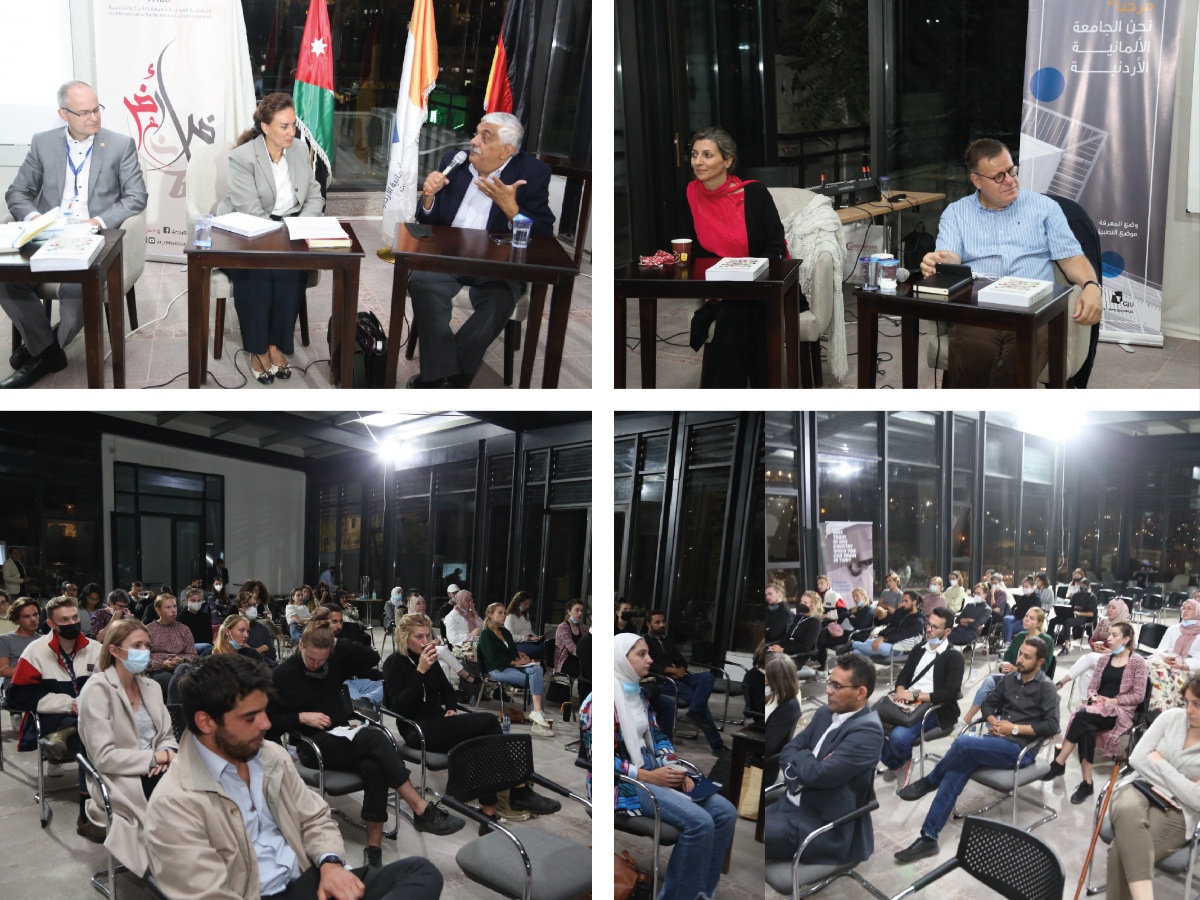Following the release of the second edition of the book “Palestinian Refugees in International Law” in 2020, Arab Renaissance for Democracy and Development (ARDD) and German Jordanian University (GJU) hosted the co-authors Francesca Albanese and Dr. Lex Takkenberg to participate in a discussion of their analysis on October 21, 2021. The authors were joined by researcher Dr. Oroub El-Abed and journalist Daoud Kuttab in a conversation surrounding the importance of international law in the treatment and the solution of Palestinian refugees. Vice President for International Affairs at GJU Professor Ralf Roßkopf moderated the event.
Prof. Ralf Roßkopf opened the event by introducing the authors and panelists and affirming the importance of the second edition of “Palestinian Refugees in International Law.” Prof. Roßkopf stated: “This is a book talk but actually much more than that, as we are talking about the largest and most protracted refugee crisis in history, which is often neglected by the international community.”
Dr. Takkenberg spoke about the process of updating the first edition of the book, which was published in 1998. He said that he was motivated to write the original version because “there was already a lot of literature on the conflict but very little on the heart of it – the Palestinian refugees.” He explained that the first edition reflected the optimism of the time period, with the premise of the Oslo Accords, but almost every political development since Oslo has adversely affected Palestinians. Due to changes in the situation on the ground and in the mindset of the international community, as well as the lack of a comprehensive, updated analysis on the Palestinian refugee question, he decided to recruit an international law expert to aid in updating the book. He thanked Albanese for adopting this responsibility and becoming the lead author.
After Dr. Takkenberg’s introduction of the book, Albanese summarized the updates of the second edition. She said “the Palestinian refugee question is not just the most protracted, longest issue worldwide, but the most difficult and must be approached with objectivity. This is what legal analysis is perfect for.” She explained that two key components of the book are: 1) the clarification of the definition of Palestinian refugees, as no two people will typically give the same answer to who is a Palestinian refugee, and 2) the inclusion of the past 20 years of research. Albanese emphasized that after the Oslo Accords, the question of Palestinian refugees went from being central to the international discourse about the conflict to a footnote of regional discussions.
Albanese then shifted the discussion to the different regimes that have jurisdiction over Palestinians. She stressed that Palestinian refugees experience different treatment under certain agencies and in certain countries, and there are many misconceptions about the responsibilities of protecting Palestinian refugees in these organizations. Albanese said that the book analyzes the roots of these misconceptions and provides documentation to clarify the origin of these regimes and their duties to not only protect Palestinian refugees but to ensure the right of return.
Dr. Takkenberg said that he and Albanese mapped all efforts towards solutions over the years and realized that a fundamental paradigm shift is vital in the mindset and approach of actors when it comes to the process of finding a solution. He noted that the issue must return to the United Nations, international law should act as a guide for the negotiations of solutions, and the right of return must stay central to the discussions. He said that in the book, they advocate for the elaboration of commitments such as the 2016 New York Declaration, which reaffirms the centrality of international law in the Palestinian question and other refugee issues through a set of instructions that deals with all aspects of protracted refugee crises, including the Palestinian refugee issue. Finally, he suggested that UNRWA lead this framework.
The discussants were given the space to reflect on the book. Dr. El-Abed praised the book for its knowledge production that clarifies many misconceptions surrounding Palestinian refugees and draws attention to the international tools represented heavily in the discussions about Palestinian refugees, including UN agencies.
Daoud Kuttab argued that what is holding back the resolution is not the right of return but the “lust for the land that Israel has.” He said that the book is an extremely important academic study that puts life to the refugee issue and discusses many vital issues within the question of Palestine.
The event comes as part of ARDD’s Question of Palestine program, which supports the cause for justice for Palestine and Palestinians through awareness-raising, dialogue, policy analysis, networking, and advocacy.


